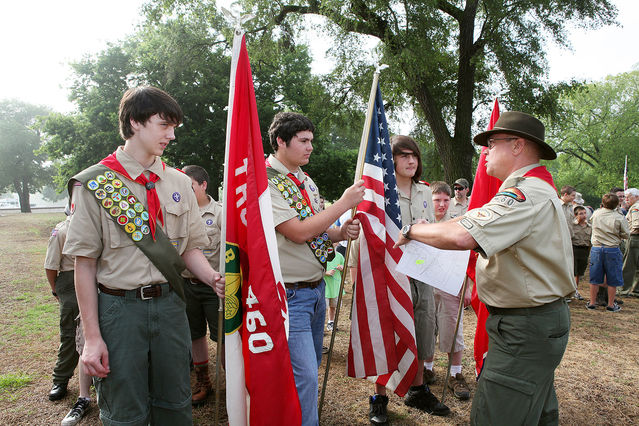Religion
Boy Scouts Still Shut the Door on Some Kids
Girls are in now, but a religious test applies
Posted October 15, 2017

The decision by the Boy Scouts of America (BSA) to open its membership to girls might be seen as another step in the direction of equality, coming just four years after it finally allowed openly gay members. Following decades of resisting such progress, it seems the BSA is finally getting with the times.
But there is one demographic group that is still conspicuously excluded from the BSA. Despite progress on gender and sexual orientation, the BSA still applies one non-negotiable condition to all its membership and leadership: No atheists allowed. Perhaps you can sign up your daughter now, and the gay teenager down the street can become an Eagle Scout, but the door is still firmly shut on atheist children and families.
The BSA gets away with this religious test because courts have declared that it is a private entity, even though the group was created by an act of Congress and enjoys special governmental treatment on several levels. Eagle Scouts, for example, can enter the military at a higher rank than other enlistees, and there are others.
But no atheist—or at least no open atheist—can attain Eagle Scout status, because the BSA demands that its members and adult volunteers acknowledge the existence of God, something that neither the U.S. military nor the Girl Scouts of America demand of members or leaders.
Some might argue that this exclusion is no big deal. There are plenty of other activities we can do with our kids, right? This would be valid if the BSA were just an ordinary private club, but of course it’s not. To many Americans, the Boy Scouts are synonymous with patriotism and good citizenship, so the group's affirmative rejection of atheists sends a strong signal that nonbelievers are somehow suspect. This kind of treatment surely contributes to the public’s bias against atheists.
And as I’ve written elsewhere (see Misinformation and facts about secularism and religion), prejudice against atheists is undeserved. Large quantities of data support the notion that social problems tend to correlate more with religiosity than atheism. Without even arguing that religion causes social problems—we can agree that the well-documented correlation between religious societies and social problems does not necessarily mean that religion is the cause of such ills—the data makes it clear, at a minimum, that secularity certainly isn't a catalyst.
Such logic falls on deaf ears within the BSA, however, for the banishment of atheists continues, with no end in sight. They’ll welcome your daughter now, but only if she passes their religious test.


